Energy Researcher | Educator | Author
Michael E. Webber


Dr. Michael E. Webber is the Sid Richardson Chair in the LBJ School of Public Affairs and the John J. McKetta Centennial Energy Chair in the department of mechanical engineering at the University of Texas at Austin. In addition to his role as a faculty member, from August 2021 to September 2024, Webber served as CTO of Energy Impact Partners, a $5 billion venture fund focused on investments in cleantech and climate tech startups with the potential for deep decarbonization at speed and scale. Furthermore, from September 2018 to August 2021, Webber was based in Paris, France where he served as the Chief Science and Technology Officer at ENGIE, one of the world’s largest energy companies.
Webber’s works spans research and education at the convergence of engineering, policy, and commercialization on topics related to innovation, energy, and the environment. His group’s research tackles complex energy systems analysis with a deep record of expertise on the following: 1) grid reliability in the face of electrification and the rise of variable sources in a warming world, 2) the hydrogen sector and how it couples to other sectors such as the grid, transportation, industry, and the built environment and 3) the food-energy-water-waste nexus. He serves on the board of GTI Energy (an industry consortium formerly known as the Gas Technology Institute) and the Scientific Advisory Council for ENGIE.
Webber has authored or co-authored more than 600 publications, including five full-length general interest books, and holds 6 patents. His essays have been published in The New York Times, The Wall Street Journal, Washington Post, Scientific American and more. Webber’s scholarly articles have appeared in top journals such as Science, Nature, and Environmental Science & Technology.
His book Power Trip: the Story of Energy was published in 2019 by Basic Books with an award-winning 12-part companion series spread out over two seasons that aired on PBS, Amazon Prime, AppleTV, and in-flight entertainment on American Airlines. The series had more than 10,000 broadcasts in the United States and has been distributed in dozens of countries, ultimately reaching millions of viewers. Seasons 1 and 2 of Power Trip along with his documentary Thirst for Power and television special Energy at the Movies have been recognized with six Telly Awards (one gold, four silver, and one bronze) for excellence in television.
In 2024 Webber was selected for the Energy Thought Leader: Higher Education award by the American Energy Society and a three-year term as a Fulbright Technical Specialist by the U.S. State Department. He was selected in 2014 as a Fellow of ASME (the American Society of Mechanical Engineers), in 2018 as a member of the 4th class of the Presidential Leadership Scholars, which is a leadership training program organized by Presidents George W. Bush and William J. Clinton, and in 2022 for the Rockefeller Foundation’s prestigious writer’s residency in Bellagio, Italy. He was honored as an American Fellow of the German Marshall Fund and on four separate occasions by the University of Texas for exceptional teaching.
Webber holds a B.S. and B.A. from UT Austin, and M.S. and Ph.D. in mechanical engineering from Stanford University.
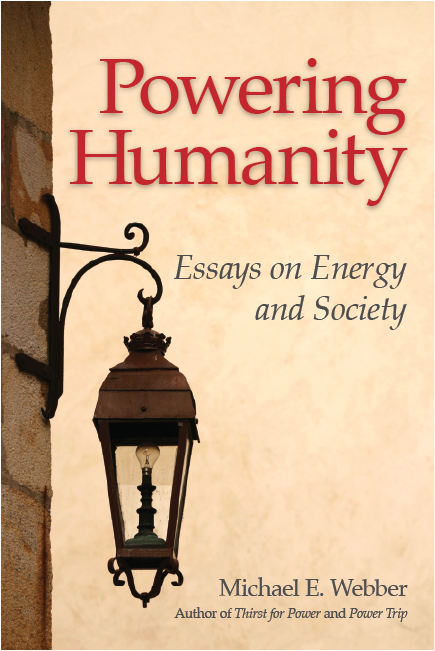
Powering Humanity: Essays on Energy and Society pulls together some of Michael E. Webber’s most notable, entertaining, sometimes prescient and sometimes flat-out wrong musings from nearly two hundred op-eds, features and general interest articles published between 2008 and 2022. These essays offer a whirlwind global tour of energy’s relevance across modern society as we collectively grapple with an energy transition that is already underway.

Energy is humanity’s single most important resource. In fact, the story of how societies rise can be told largely as the story of how they manage energy sources through time. Today, as we face down growing demand for and accumulating environmental impacts from energy, we are at a crossroads and the stakes are high. We must look for long-term solutions.

Thirst For Power offers a new, holistic way of thinking about energy and water—a big picture approach that reveals the interdependence of the two resources, identifies the seriousness of the challenges, and lays out an optimistic approach with an array of solutions to ensure the continuing sustainability of both.
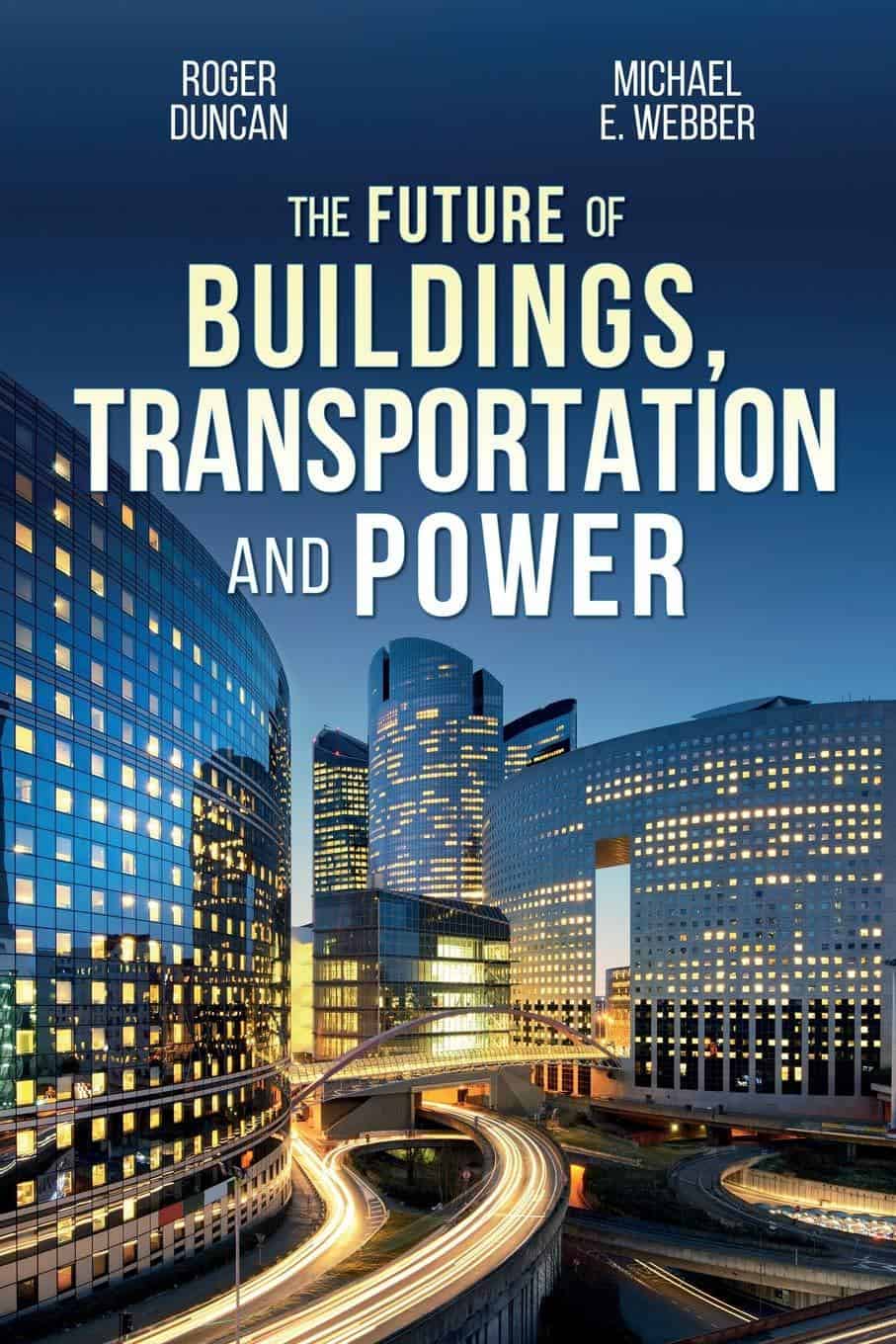
The evolution of buildings, transportation and power will determine how our future looks and feels. Buildings may develop personalities and the transportation system will have any manner of vehicle available at a moment’s notice. Co-author Roger Duncan is a former Austin city council member and former general manager of Austin Energy, the city’s municipal electric utility.

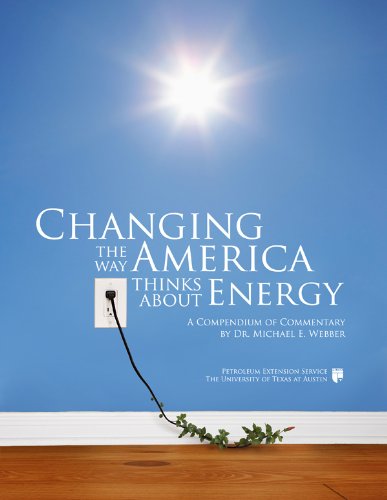
Engineer and energy policy expert Dr. Michael E. Webber presents a series of original insights on energy strategy. He applies his technical knowledge to offer prescriptions for sound, rational energy policy solutions at the state, federal, and international level. His analysis, in the form of a collection of published articles, focuses on energy solutions that lie both inside and outside the conventional wisdom.
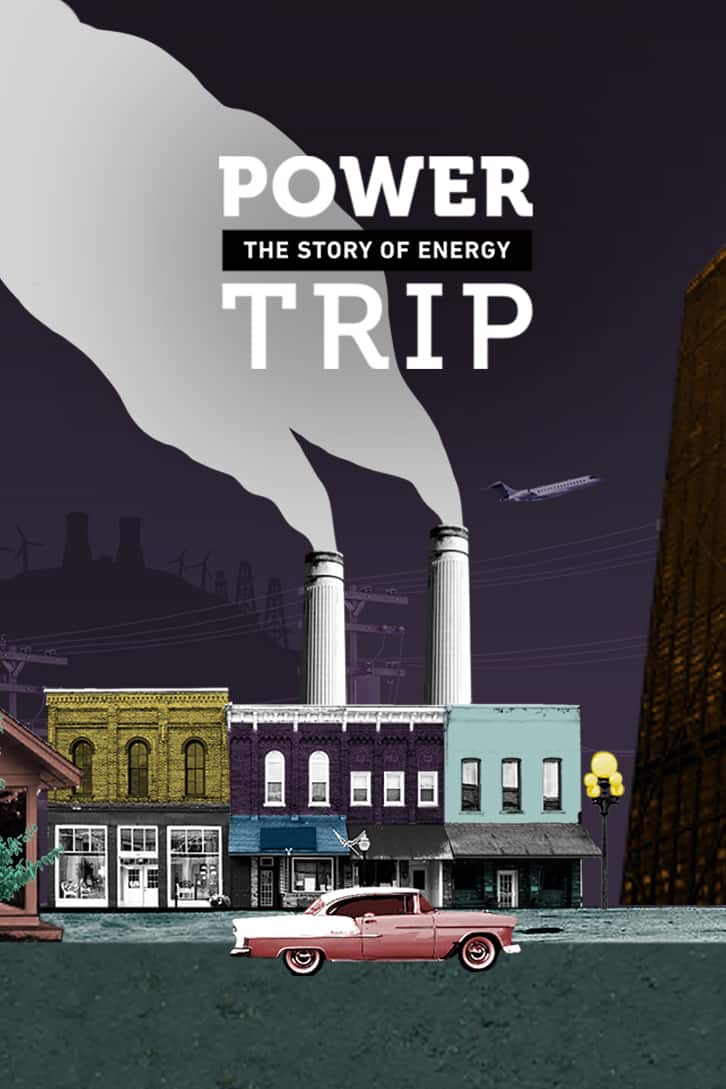
Starting with energy’s end-uses and outcomes, this 12-part series goes backwards and sideways to uncover hidden parts of this vast, ubiquitous system, revealing surprises and fun facts along the way. Filmed on location in the US, France, Singapore, Japan, Ireland, and England, Power Trip is about the people, inventions, and systems that shape our modern world.

Water and energy are the two fundamental components of a society, and they are interconnected. Thirst for Power, shot on location across France, California, and Texas, explores the history of civilization’s quest to procure abundant water and energy — from ancient Roman aqueducts in Europe to modern America’s vast hydroelectric infrastructure.

Movies frequently serve as a snapshot of society, capturing sentiments of each time period. Many films have themes that memorialize collective optimism, fears, and observations about energy.
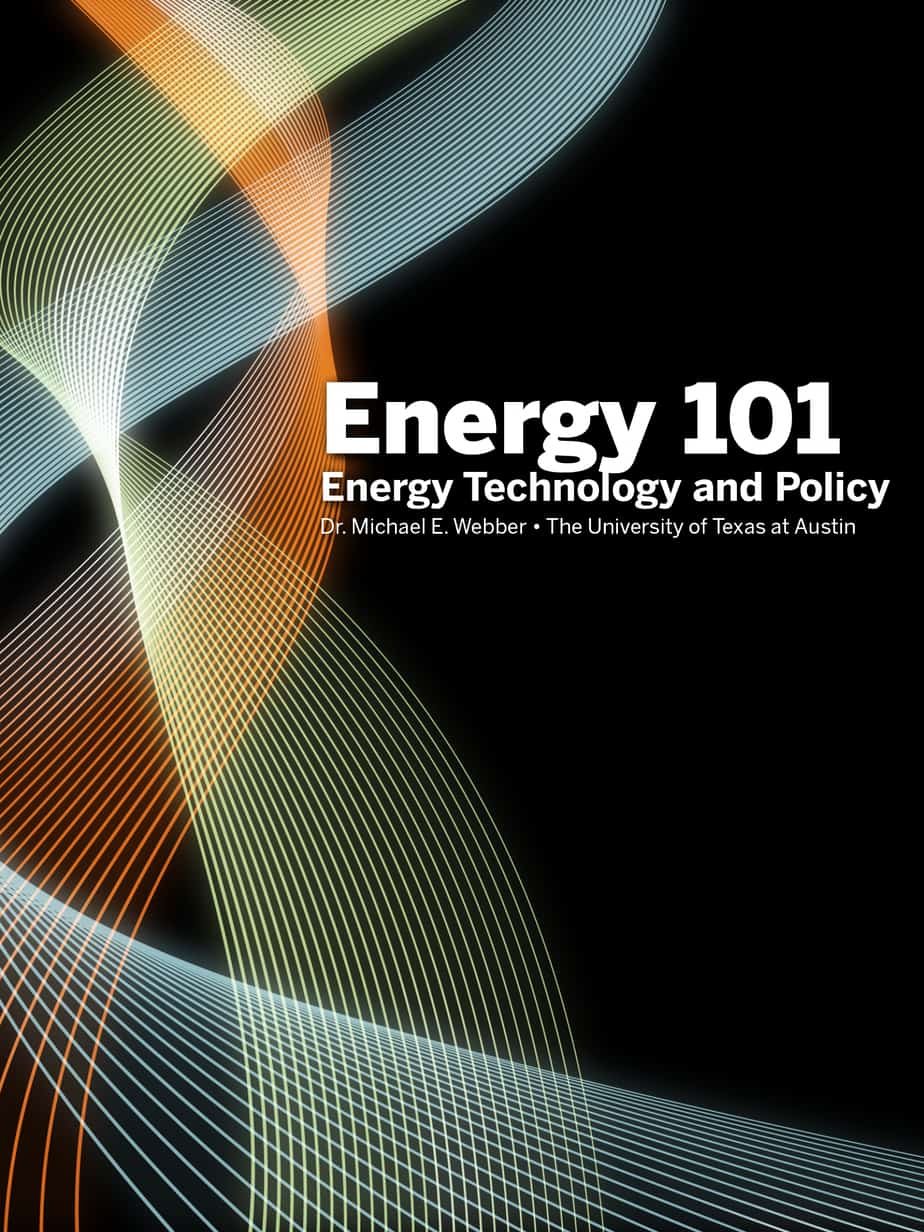
Based on Dr. Webber’s groundbreaking Massive Open Online Course (MOOC) and signature graduate level course “Energy Technology & Policy,” Energy 101 provides budget-friendly access to powerful energy data to support research, writing and study habits in a variety of academic settings. With energy fluency, you will be able to think more critically about global energy issues.
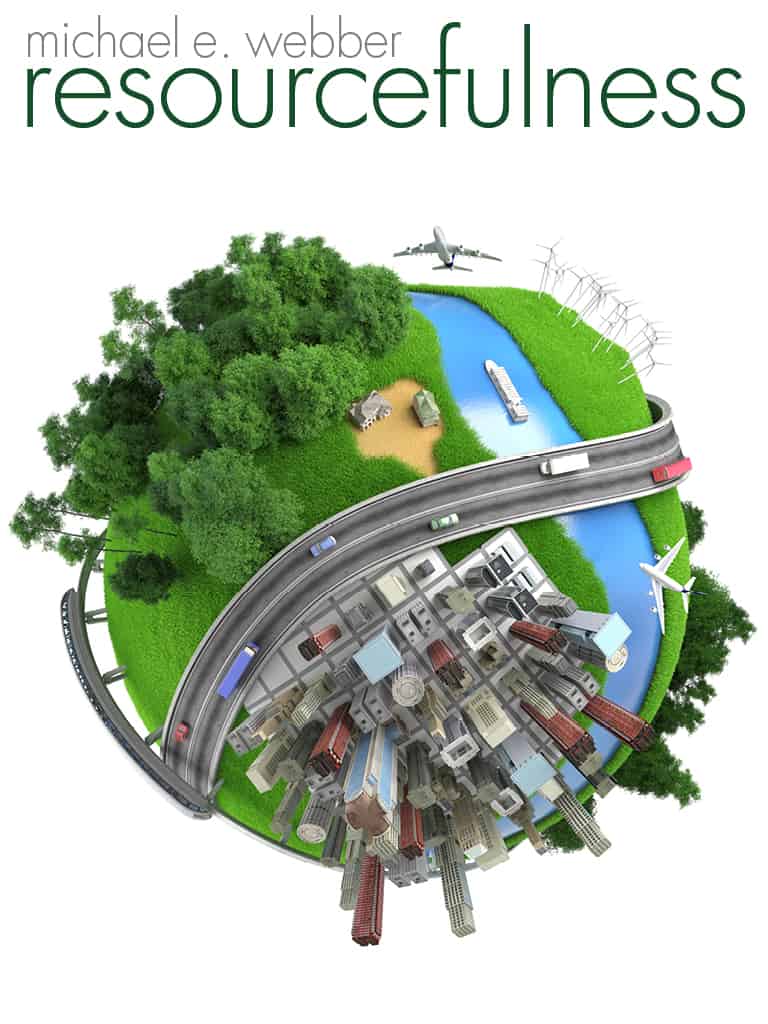
Resourcefulness: An Introduction to the Water-Energy Nexus teaches key concepts about water and energy for students, industry professionals, and the general public. Our goal is to improve water and energy literacy, encourage conservation, and inspire the next generation of innovators.

Watt Watchers of Texas is a state-sponsored STEM program to help boost energy literacy for K-12 students and help schools save money by saving energy. Through the program, students, teachers, and families will have access to energy saving tips, activities, and lessons.
One year after the devastating wildfires in Maui and recent outages caused by Hurricane Beryl, it is evident that the U.S. electricity grid is increasingly vulnerable due to aging infrastructure and intensifying climate-related threats. The grid, crucial for modern society, has not been sufficiently updated, resulting in catastrophic failures like the wildfires ignited by downed power lines. Despite available solutions—such as burying power lines, modernizing technology, and improving maintenance—utilities face pressure to keep costs low, leading to neglect. As climate change exacerbates risks, including longer fire seasons and extreme weather, it is imperative to invest in infrastructure that can withstand future challenges. This requires not only funding but also a shift in mindset to acknowledge the urgent need for a resilient and modernized grid.
As a record-setting heatwave blankets Texas, ERCOT, the manager of the state's grid, urges consumers to voluntarily reduce power consumption to prevent potential outages. Dr. Michael E. Webber suggests a more effective approach, proposing that utilities pay individuals to reduce energy use during peak hours, particularly by temporarily shutting off air conditioners, offering financial incentives and contributing to grid stability in the face of increasing heatwaves exacerbated by climate change.
Despite being a leader in both oil and gas production and renewable energy, reactionary forces in the Texas Legislature aim to impede clean energy growth while favoring fossil fuels. The proposed measures, including tax incentives for oil and gas projects and setbacks for wind farms, threaten the state's position as a global leader in energy production and may hinder its role in national decarbonization efforts, despite the recent federal push for clean energy projects in Texas.
For decades in the climate change debates, we’ve heard that reducing carbon emissions will cost society too much money. Indeed, curbing CO2 emissions is expensive. For a large economy like the U.S., which emits about six billion tons annually, the price tag can range anywhere from a staggering $60 to $600 billion. Every year.
Donald J. Trump made many important campaign promises on his way to victory. But saving coal is one promise he won’t be able to keep. Many in Appalachia and other coal-mining regions believe that President Obama’s supposed war on coal caused a steep decline in the industry’s fortunes. But coal’s struggles …
With the recent congressional budget negotiations putting a spotlight on the need to raise revenues, and with our transportation infrastructure in many places crumbling before our eyes, it is time to consider modernizing the gas tax. Doing so would help fill the budget gap while updating and improving our transportation systems …
On December 20, 2015, a mountain of urban refuse collapsed in Shenzhen, China, killing at least 69 people and destroying dozens of buildings. The disaster brought to life the towers of waste depicted in the 2008 dystopian animated movie WALL-E, which portrayed the horrible yet real idea that our trash could pile up uncontrollably, squeezing us out of our habitat. A powerful way to transform …
In June the state of Florida made an unusual announcement: it would sue the U.S. Army Corps of Engineers over the corps’s plan to reduce water flow from reservoirs in Georgia into the Apalachicola River, which runs through Florida from the Georgia-Alabama border. Florida was concerned that the restricted flow would threaten certain endangered species. Alabama also objected, worried …
For review copies, press materials, and author photographs, or to schedule an event, please contact Sarah De Berry-Caperton:
sarahdc@austin.utexas.edu | (512) 471-7838
For film and television rights, please contact Juan Garcia:
jgarcia3rd@gmail.com | (512) 577-7017
For information about professional speaking engagements, please contact Tom Neilssen at BrightSight Speakers: tom@brightsightspeakers.com
For consulting inquiries, please contact webber@ideasmiths.net